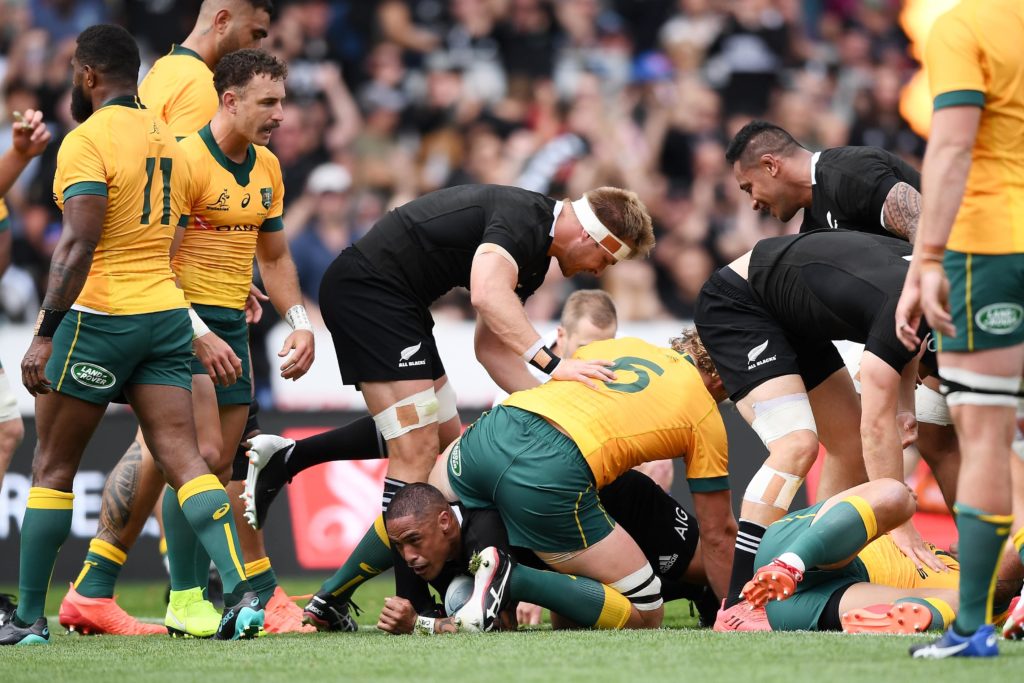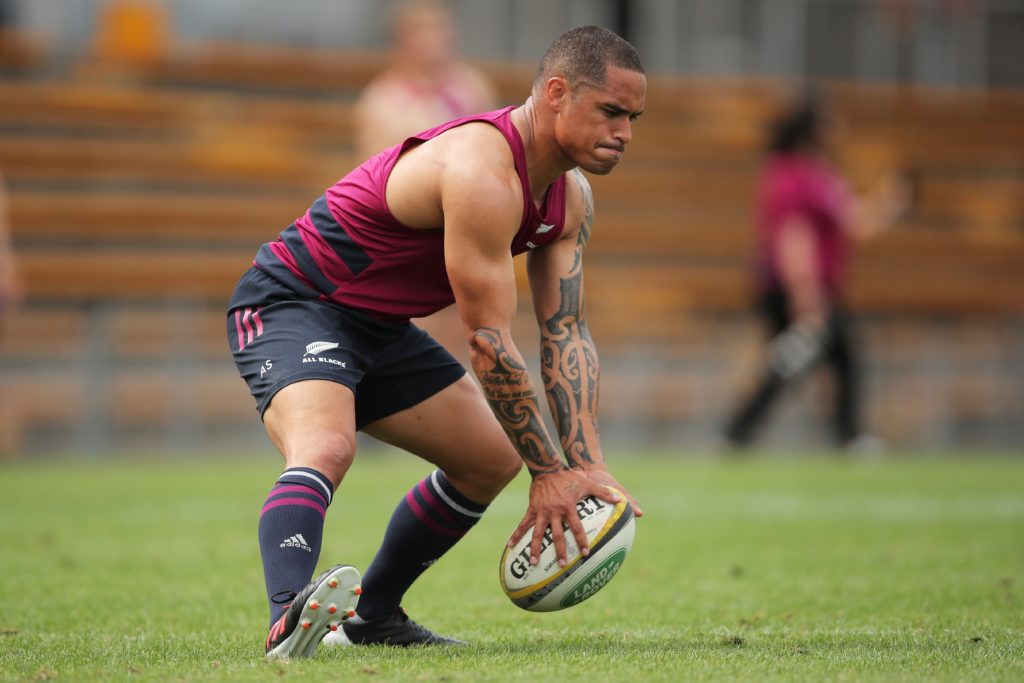There is obviously no guarantee the All Blacks will win the next World Cup with Aaron Smith, but it’s a near certainty they won’t win it without him.
The man whose contract New Zealand Rugby came perilously close to terminating four years ago is now set to become one of the country’s highest paid players if he agrees to commit to an extension that will take him through to 2023.
And NZR need him to agree because the country’s famed conveyor belt of talent has hit a glitch and hasn’t spat out a scrum-half of similar class for several years. But Smith’s value and importance to the All Blacks isn’t built exclusively on the lack of alternatives.
Even if there were good number nines falling out of trees, Smith would still be the highest priority player for NZR to lock into a contract beyond next year for the simple reason he gives the All Blacks the ability to play with the pace and width that can make their attack deadly.
There simply isn’t another scrum-half in the country – the world even – that offers the same skill-sets as Smith and the All Blacks can’t be the team they want to be without him.
There simply isn’t another scrum-half in the country – the world even – that offers the same skill-sets as Smith and the All Blacks can’t be the team they want to be without him.
To some extent All Blacks coach Ian Foster has become a victim of his and former coach Steve Hansen’s bravery in 2012. When they first hooked up as a coaching duo ahead of Super Rugby that year, they kicked around ideas and found that they shared a belief that the All Blacks needed to move away from selecting muscular, physically imposing nines and find an out and out passer with the speed and aerobic capacity to get to every ruck.
The brave part was that they would be looking for an athlete with a totally different body shape to the sorts of players that had previously been picked. In a game increasingly obsessed with size, power and collisions, they were going to go against the tide and pick an 80kg welterweight who could snugly curl up and sleep in one of lock forward Luke Romano’s size 18 boots.
It was high risk, high reward, though. They committed to Smith and he in turn committed himself to dropping 10 skinfold measurements to enable him to play for 70 minutes, 80 if he had to, at full capacity.

The All Blacks haven’t always been the world’s best side during Smith’s eight seasons, but they have been the world’s best attacking side and while the magic produced by the likes of Dan Carter, Beauden Barrett, Ben Smith and Ma’a Nonu has obviously helped, the key to it all has been the little bloke who has worn the No 9 jersey in 97 tests since 2012.
Between 2012 and 2019, the All Blacks scored 496 tries. That was an an average of 4.4 per test. The next most prolific side in that period were England who scored 301 – just 60 per cent of the All Blacks’ total. Australia were the next best attacking team with 296 tries. South Africa scored 291, Ireland 280, Wales 212 and France 180.
In 2016 the All Blacks scored 80 tries – a number it took France the entire 2012-2015 World Cup cycle to reach. The prevailing view is that defences are dominating the game but the All Blacks still managed to score 287 tries in the last World Cup cycle at an average of 5.4 a game.
Even this year, one where rugby has seemingly been plunged further into a defensive and box-kicking mire, the All Blacks scored 21 tries in six tests – the majority of which Smith had a hand in creating or finishing.
He is the All Blacks’ attacking differentiator – the man whose precision passing, split-second decision-making and all round game management enables his side to create space and opportunity against the most rigid defences.
He is the All Blacks’ attacking differentiator – the man whose precision passing, split-second decision-making and all round game management enables his side to create space and opportunity against the most rigid defences.
Put another way – the All Blacks never look the same threat when Smith leaves the field or doesn’t play. TJ Perenara has a range of skills and abilities but they don’t give the All Blacks the same range of attacking possibilities and, probably more obviously than any time since 2012, this year highlighted the gulf in quality between the top ranked halfbacks.
What also became apparent in 2020 is that Smith’s desire to play at the highest level remains undiminished and at 32 he’s a better player than he was at 22. He’s just as quick and just as accurate with his passing and probably even fitter while adding a clever and strong kicking game to his repertoire as well as a leadership element.
That last component was put on full public view after the All Blacks opened their season with a 16-all draw with the Wallabies in October – a game in which Smith held himself culpable for the under performance.
“I just want to always keep pushing myself to another level of my performance and it wasn’t good enough at the weekend,” Smith said a few days later. “If you don’t show up with the right intent mentally, it’s a long day.

“My own standard wasn’t up to it. My passing was erratic, inaccurate and really set us up. It gave them shots at Richie Mo’unga, it didn’t give our forwards opportunities to run on to the ball … things I take pride in I need to sharpen up.”
It was a sign of not only the standards he expects of himself but also his new found maturity and contentment. Since his annus horriblis in 2016, Smith has given up alcohol, attended counselling and become a father – all of which has enabled him to channel his incredible passion and energy into all the right areas.
He’s a different man and indeed a different player to the one he was four years ago and arguably the highest priority signing NZR has to make next year.
Curiously, Smith, captain Sam Cane and veteran hooker Dane Coles are the three most senior All Blacks not contracted beyond 2021 and are also the three players on the shortlist for player of the year.
Cane will be an easy enough negotiation. He’s not going to walk away from being the All Blacks captain in the middle of a World Cup cycle. Coles, at 34, proved he can still be brilliantly mobile, abrasive and effective at the highest level, and doesn’t seem interested in an overseas stint.
“I just want to always keep pushing myself to another level of my performance… If you don’t show up with the right intent mentally, it’s a long day.
All Blacks scrum-half Aaron Smith
The prospect of playing at a third World Cup and taking on a mentoring role – much like Keven Mealamu did between 2012 and 2015, no doubt carries significant appeal for Coles. At his age, and with three young children, a two-year extension will be hard to turn down.
But Smith will have options. He’ll be in demand around the world and even with Covid having impacted budgets, there will be clubs able and willing to throw huge money at him.
When he re-signed for two years in 2019, he said he’d received offers to leave, but: “I don’t want to look back and go I wish I’d done that in New Zealand or I wish I’d achieve that or I wish I’d stayed and done that. At the moment I see too many things I want to try and do in New Zealand.
“I talk to a lot of people who have signed overseas and they tell you the grass ain’t greener. It’s tough, the rugby’s different, the cultures are not the same, they don’t look after you or your partners as well. It’s a bit of the wild, wild west.”
To lose Smith would be disastrous. The All Blacks can all but forget about winning the next World Cup if they don’t capture his signature and what looms now is a landmark moment – a point in time where history is going to be dramatically shaped one way or the other.


Comments
Join free and tell us what you really think!
Sign up for free